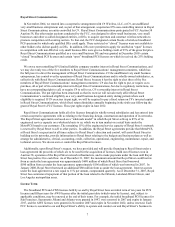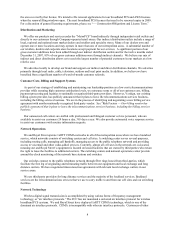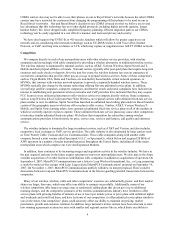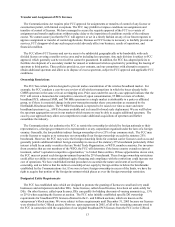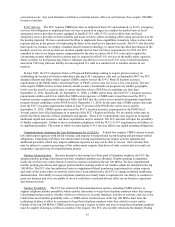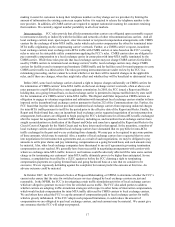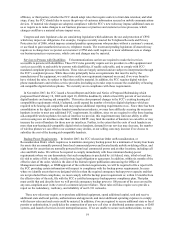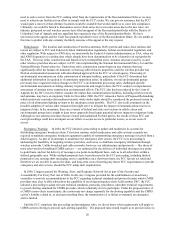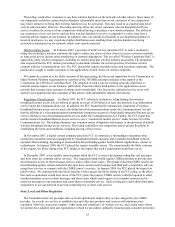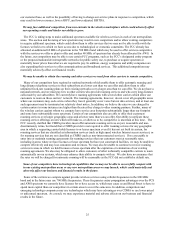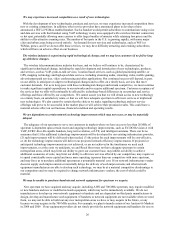Metro PCS 2007 Annual Report Download - page 27
Download and view the complete annual report
Please find page 27 of the 2007 Metro PCS annual report below. You can navigate through the pages in the report by either clicking on the pages listed below, or by using the keyword search tool below to find specific information within the annual report.
16
conversion occur. Any such alteration could have a material adverse effect on our business if we acquire 700 MHz
licenses at auction.
E-911 Service. The FCC requires CMRS providers to implement basic 911 and enhanced, or E-911, emergency
services. Our obligation to implement these services is incurred in stages on a market-by-market basis as local
emergency service providers become equipped to handle E-911 calls. E-911 services allow state and local
emergency service providers to better identify and locate wireless callers, including callers using special devices for
the hearing impaired. We have constructed facilities to implement these capabilities in markets where we have had
requests and are in the process of constructing facilities in the markets we launched recently. The FCC also has rules
that require us, because we employ a handset-based location technology, to ensure that specified percentages of the
handsets in service on our systems are location capable and we have met these requirements. In 1999, the FCC
amended its rules to no longer require compensation by the state to carriers for E-911 costs and to expand the
circumstances under which wireless carriers may be required to offer E-911 services to the public safety agencies.
States in which we do business may limit or eliminate our ability to recover our E-911 costs. Federal legislation
enacted in 1999 may limit our liability for uncompleted 911 calls to a similar level to wireline carriers in our
markets.
In June 2007, the FCC adopted a Notice of Proposed Rulemaking seeking to require greater accuracy in
establishing the location of wireless subscribers placing E-911 emergency calls and, in September 2007, the FCC
adopted a Report and Order which requires CMRS carriers to meet the E-911 Phase II location accuracy
requirements at the Public Safety Answering Point, or PSAP, service-area level over a five year period. The new
rules require CMRS carriers to meet interim, annual accuracy benchmarks on progressively smaller geographic
levels over the next five years in order to ensure that they achieve PSAP-level compliance no later than
September 11, 2012. Specifically, by September 11, 2008, a CMRS carrier must meet the FCC’ s location accuracy
requirements within each EA in which the CMRS carrier operates; a CMRS carrier must then meet the FCC’ s
location accuracy requirements within each MSA and RSA that the carrier serves and also demonstrate significant
progress toward compliance at the PSAP-level by September 11, 2010; by the same date, CMRS carriers also must
meet the FCC’ s location requirements within at least 75 percent of the PSAPs the carrier serves; and by
September 11, 2012, CMRS carriers must meet the FCC’ s location accuracy requirements at the PSAP-level.
Several carriers have filed challenges to or appeals of the FCC’ s Report and Order. We are unable at this time to
predict the likely outcome of these challenges and appeals. These E-911 requirements may require us to expend
additional capital and resources, and these expenditures may be material. The FCC also has left open the possibility
of further requirements. Failure to meet or maintain compliance with the FCC’ s E-911 requirements can subject us
to significant penalties. The extent to which we must deploy E-911 services affects our capital spending obligations.
Communications Assistance for Law Enforcement Act (CALEA). Federal law requires CMRS carriers to assist
law enforcement agencies with lawful wiretaps, and imposes wiretap-related record-keeping and personnel-related
obligations. Complying with these law enforcement wiretap requirements may require systems upgrades and
additional personnel, which may impose additional expenses we may not be able to recover. Our customer base
may be subject to a greater percentage of law enforcement requests than those of other carriers and as a result our
compliance expenses may be proportionately greater.
Number Administration. Because demand is increasing for a finite pool of telephone numbers, the FCC has
adopted number pooling rules that govern how telephone numbers are allocated. Number pooling is mandatory
inside the wireline rate centers that are located in counties included in the top 100 MSAs. We have implemented
number pooling procedures and support pooled number roaming in all of our markets which are included in the top
100 MSAs. The FCC also has authorized states to supplement federal numbering requirements in certain respects
and some of the states where we provide service have been authorized by the FCC to engage in limited numbering
administration. Our ability to access telephone numbers on a timely basis is important for our ability to continue to
grow our business and if we are unable to do so it could have a material adverse effect on our business, operations
and financial results.
Number Portability. The FCC has ordered all telecommunications carriers, including CMRS carriers, to
support telephone number portability which enables subscribers to keep their telephone numbers when they change
telecommunications carriers, whether wireless to wireless or, in some instances, wireline to wireless, and vice versa.
Under these local number portability rules, a CMRS carrier located in one of the top 100 MSAs must have the
technology in place to allow its customers to keep their telephone numbers when they switch to a new carrier.
Outside of the top 100 MSAs, CMRS carriers receiving a request to allow end users to keep their telephone numbers
must be capable of doing so within six months of the request. The FCC also recently released a Declaratory Ruling



